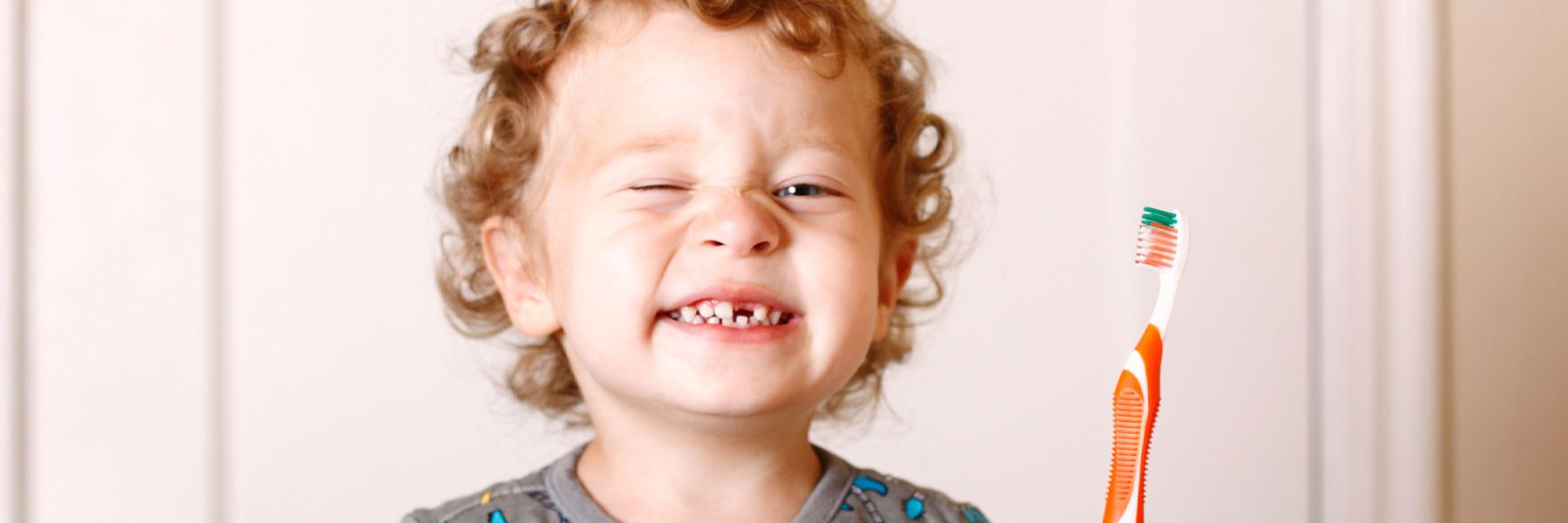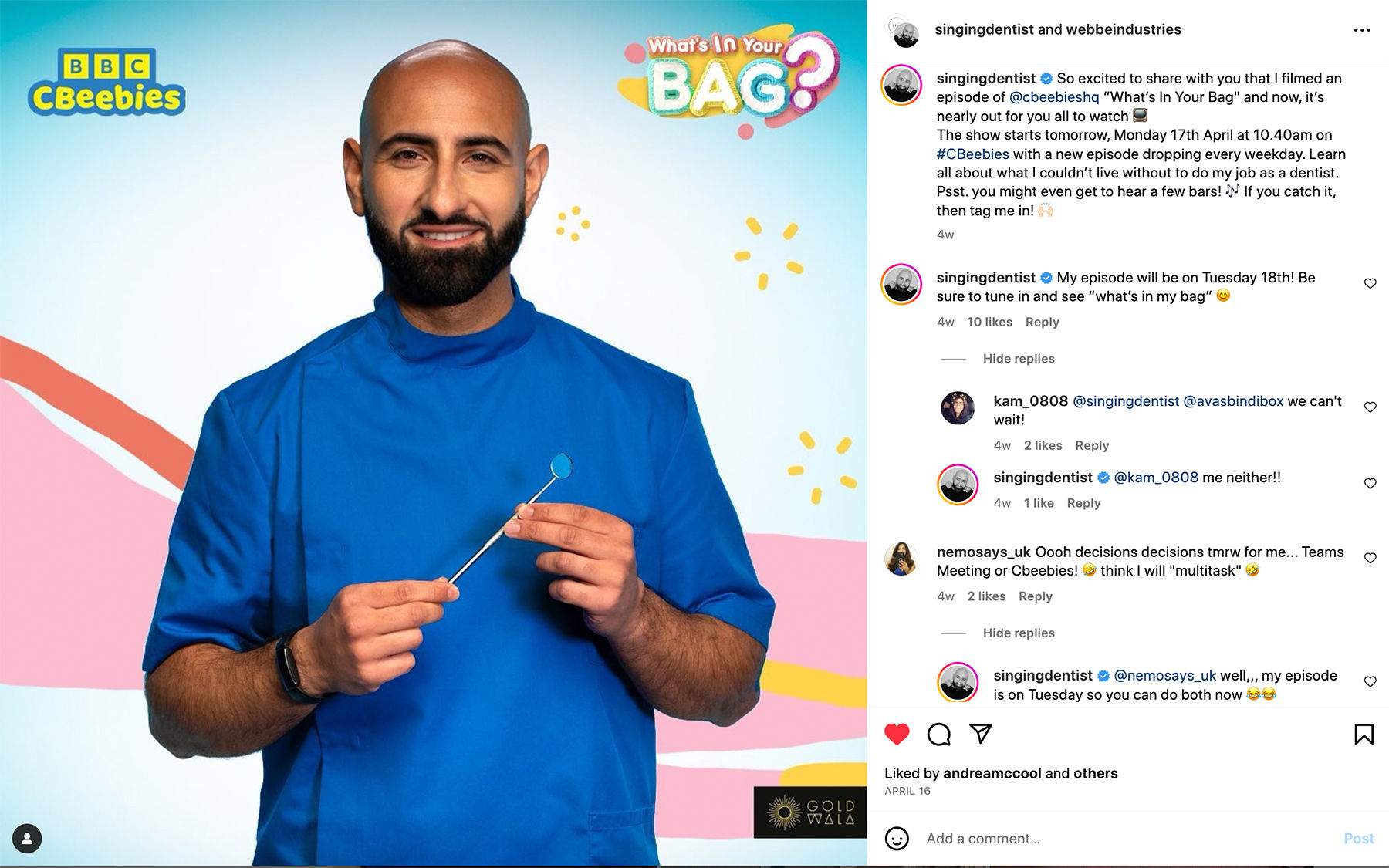Use arrow keys to navigate through the menu items. Use Tab key to navigate through the menu banners.
Toddler Toothbrushing

Toddler Toothbrushing
If toothbrushing has become a twice-daily battle, don’t despair. Dentist Dr Milad Shadrooh (@singingdentist) has tips to help you both stay smiling
Let's face it, toddler toothbrushing can be quite the challenge. From wriggling escapes to full-blown tantrums, we've all been there. ‘Whenever I got the toothbrush out, my 18-month-old would refuse to open his mouth!’ says mum Amber Davis. ‘It became a power struggle.’
Sometimes it may be tempting to avoid the battle and skip your toddler’s toothbrushing session. ‘Don’t do it!’ says dentist Dr Milad Shadrooh. ‘While it’s true that baby teeth will fall out, there are many reasons why it’s vital to look after them.’
‘For starters, baby teeth are softer than adult teeth so they can decay quickly if they aren’t kept clean. Losing baby teeth early due to tooth decay and extractions can lead to problems with the developing adult teeth, as well as failure to thrive due to eating difficulties and delayed speech development.’
‘A 2020 oral health survey found that a scary 11% of three-year-olds had already experienced dental decay. Keeping your child’s teeth clean and taking them to the dentist regularly can help prevent this happening.’
Setting up a routine
Many parents don’t realise that they should start a toothbrushing routine as soon as their baby’s first tooth emerges, which is usually around six months. If you haven’t set up a regular routine yet, now is the time to start.
‘Establishing a twice-daily toothbrushing routine will set good habits for life!’ says Dr Milad. ‘The duration of brushing depends on how many teeth your child has, but as long as some toothpaste has contacted each and every tooth, and some sort of gentle scrubbing has been done, then that is sufficient.’
When and how to brush
‘You should aim to brush once in the morning, ideally before breakfast, and then last thing at night just before bed,’ says Dr Milad. ‘After brushing, teach your child to spit out the excess toothpaste, but don’t rinse the mouth. This will allow the fluoride from the toothpaste to continue protecting their teeth for up to 30 minutes after brushing. You should help and supervise your child’s toothbrushing up to the age of seven.’

Choosing the right tools
It’s best to use a toddler-friendly toothbrush and toothpaste. Children’s toothbrushes have soft bristles and a small head for an effective, gentle clean, while children’s toothpaste has just the right amount of fluoride for their age.
To help your toddler feel more involved, let them choose their own toothbrush next time you’re in Asda. “Noah picked a bright blue and orange one and he loves it. He doesn’t make a fuss about tooth brushing now,” says mum Amber.
Toothbrushing tips
-
Use a tiny smear of fluoride toothpaste (1350-1500ppm) for babies and toddlers up to three years old, and a pea-sized amount for children aged three to six years.
-
The easiest way to brush a toddler’s teeth is to stand behind them and gently tilt their head backwards. Brushing in front of a mirror can help you both see what you’re doing.
-
Brush their teeth in small circles, covering all the surfaces, and encourage your child to spit the toothpaste out afterwards. There's no need to rinse with water, as this will wash away the fluoride.
-
Brush twice a day for up to two minutes each time (depending on how many teeth your child has) in the morning and just before bed.
-
Carry on helping your child brush their teeth until you're sure they can do it well enough themselves. This will normally be until they're at least seven.
Creating a fun and engaging routine
By incorporating play into your child's toothbrushing routine, you can make it a positive experience for them. Here are some tips to make toothbrushing fun for your little ones.
-
Use songs and rhymes: Singing along as you scrub will make the routine more engaging for toddlers. You can make up your own song or find one online – we love the Toothbrushing Song by CBeebie’s Hey Duggee. ‘As the Singing Dentist, I also have some dental bangers out there! You can check them out on my episode of What’s in Your Bag? on CBeebies and on my social media,’ says Dr Milad.
-
Read stories: Reading books about brushing teeth can help your child understand the importance of keeping their little teeth clean. The picture book Brush, Brush, Brush by Alicia Padron has a rhyme that you can recite together while tooth brushing.
-
Make it a game: Challenge yourselves to brush all your toddler’s teeth before the timer goes off, or make a game out of spitting the toothpaste into the sink. You can brush your own teeth at the same time as your child and then help them finish their own.
-
Take it in turns: You can brush your child’s teeth first and then let your child practice brushing after, or you can reverse the order. This will help your child feel more involved and independent.
-
Practise on teddy: Bring in a favourite stuffed animal or doll, and let your child “brush” the toy’s teeth (without toothpaste, of course!) while you brush your child’s teeth.
Dealing with challenges
If your toddler is still resistant to having their teeth brushed, one strategy is to use a reward chart, where they can earn a sticker for each successful tooth brushing session.
If your child continues to resist toothbrushing, you could try moving to a different room or even a different time of day. Try to remain calm and patient, and avoid making toothbrushing a negative experience.
‘I decided to stop brushing Freya’s teeth at the bathroom sink, which was associated with tantrums and stress, and instead started doing them when she was in the bath. This has been a great success – it feels more fun for both of us!’ says mum Kiera Bryan, mum to Freya, 16 months.
By being creative and persistent, parents can help their child develop good oral hygiene habits while minimising the stress and frustration that can crop up during tooth brushing.
Dr Milad agrees. ‘Good early habits with regards to toothbrushing and visiting the dentist will help to keep your tot’s teeth strong and healthy – and keep you both smiling!’
Help & Customer service
- Help Centre
- How to shop
- Product recalls
Payment Methodslist with 8 items
- Asda Group of Companies
- Modern Slavery Statement
- Electrical Waste Recycling
- Terms & Conditions
- Customer Review Policy
- Privacy Centre
- Cookie Settings
- Accessibility
© ASDA 2025